Sea of the Caliphs
The Mediterranean in the Medieval Islamic World
Christophe Picard author Nicholas Elliott translator
Format:Hardback
Publisher:Harvard University Press
Published:26th Jan '18
Currently unavailable, and unfortunately no date known when it will be back

“How could I allow my soldiers to sail on this disloyal and cruel sea?” These words, attributed to the most powerful caliph of medieval Islam, Umar Ibn al-Khattab (634–644), have led to a misunderstanding in the West about the importance of the Mediterranean to early Islam. This body of water, known in Late Antiquity as the Sea of the Romans, was critical to establishing the kingdom of the caliphs and for introducing the new religion to Europe and Africa. Over time, it also became a pathway to commercial and political dominion, indispensable to the prosperity and influence of the Islamic world. Sea of the Caliphs returns Muslim sailors to their place of prominence in the history of the Islamic caliphate.
As early as the seventh century, Muslim sailors competed with Greek and Latin seamen for control of this far-flung route of passage. Christophe Picard recreates these adventures as they were communicated to admiring Muslims by their rulers. After the Arab conquest of southern Europe and North Africa, Muslims began to speak of the Mediterranean in their strategic visions, business practices, and notions of nature and the state. Jurists and ideologues conceived of the sea as a conduit for jihad, even as Muslims’ maritime trade with Latin, Byzantine, and Berber societies increased.
In the thirteenth century, Christian powers took over Mediterranean trade routes, but by that time a Muslim identity that operated both within and in opposition to Europe had been shaped by encounters across the sea of the caliphs.
[Picard is] the leading scholar of Islamic maritime history…This will surely become the standard work on Islam and the sea in the early Middle Ages. -- David Abulafia * Times Literary Supplement *
A leading authority on medieval Islamic history, Picard analyzes the involvement in and approach to the Mediterranean Sea by Muslims and their principalities from the dawn of Islam to the twelfth century, when the balance of power tilted in favor of Latin Christendom. Going beyond internal developments, he examines relations both collaborative and conflictive with Byzantium, the Latin world, and Berber nations. As a history of the Mediterranean, this book is unique in placing the Islamic world at the center. -- Brian A. Catlos, University of Colorado
By shining a light on this obscure period, Christophe Picard brings a new dimension to Braudel’s Mediterranean, as a place where the voices of Latins, Byzantines, and Muslims are integrated. * Livres Hebdo *
In Sea of the Caliphs, Picard shows that the Mediterranean, long considered marginal to Islam, even reduced to a clichéd playground for pirates, was in reality a major site for the development of Muslim societies between the seventh and twelfth centuries. He recasts the traditional view of Fernand Braudel by making Islam the dominant actor in this space for several centuries, not only as a military power but also as a commercial and intellectual force. * Le Monde *
A masterful revision of the common view of Arabs and Muslims as primarily pirates in medieval Mediterranean history. -- B. Weinstein * Choice *
A comprehensive account of the various ways that medieval Islam’s highest political authorities—its caliphs, whether Sunni or Shi’ite—used naval warfare on the Mediterranean Sea to defend and expand the borders of their territories. -- Sarah Davis-Secord * H-Net Reviews *
ISBN: 9780674660465
Dimensions: 235mm x 156mm x 32mm
Weight: 789g
416 pages